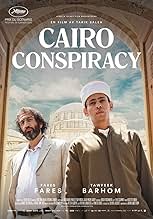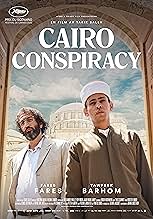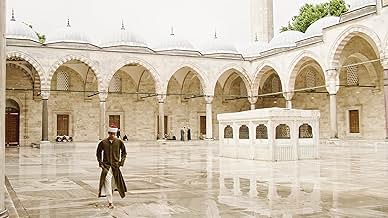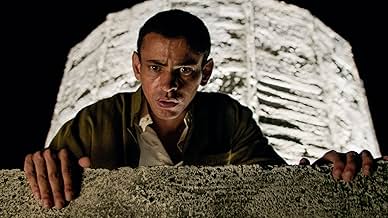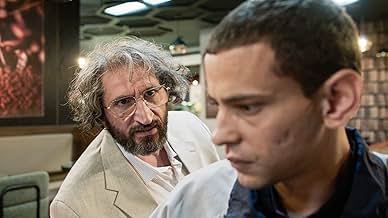IMDb RATING
6.9/10
8.7K
YOUR RATING
Adam, the son of a fisherman, is offered the privilege to study at the Al-Azhar University in Cairo, the center of power of Sunni Islam. Adam becomes a pawn in the conflict between Egypt's r... Read allAdam, the son of a fisherman, is offered the privilege to study at the Al-Azhar University in Cairo, the center of power of Sunni Islam. Adam becomes a pawn in the conflict between Egypt's religious and political elites.Adam, the son of a fisherman, is offered the privilege to study at the Al-Azhar University in Cairo, the center of power of Sunni Islam. Adam becomes a pawn in the conflict between Egypt's religious and political elites.
- Awards
- 5 wins & 21 nominations total
Mohammad Bakri
- General Al Sakran
- (as Mohamad Bakri)
Makram Khoury
- Blind Sheikh Negm
- (as Makram J. Khoury)
Ahmed Laissaoui
- Raed
- (as Ahmed Lassaoui)
Hassan El Sayed
- Village Imam
- (as Hassan El-Sayed)
- Director
- Writer
- All cast & crew
- Production, box office & more at IMDbPro
Featured reviews
This movie has shaken Egypt to its very core, it has been deemed so provocative that it is BANNED. The director is Egyptian, the move is set in Cairo (yet filmed funnily enough in Istanbul because of the ban). It has yeilded award in the Cannes film festival, and it is simply put SUPERB.
The camera is well used, the atmosphere build up is immensely satisfying. And it ultimately proves the old saying "Man will be free when the last King has been strangled with the last priests entrials"- This is a CULT movie in the making. Unfortunately you will never see this film in Egypt.
The camera is well used, the atmosphere build up is immensely satisfying. And it ultimately proves the old saying "Man will be free when the last King has been strangled with the last priests entrials"- This is a CULT movie in the making. Unfortunately you will never see this film in Egypt.
If there are certain films that we consume and extract everything they want to tell us at the moment it ends, there are others that have much to explore and understand between the lines. Cairo Conspiracy - previously called Boy From Heaven, a much more suitable title - is a political and religious thriller with some very clear messages but also a lot to read and extrapolate.
The story is simple and seemingly contained. It tells us about a boy, Adam (Tawfeek Barhom), who receives a letter that will change his life: he has been accepted at the prestigious Al-Azhar University in Cairo, Egypt. As soon as he arrives, the Grand Imam of al-Azhar dies suddenly, and a power struggle to replace him begins. For someone with little knowledge of the culture in question and what this position actually represents - believe me, this is much more than a mere college dean in the US - it may seem strange why this is such a coveted place. Why do some people kill? Why do some people give their lives? I confess that when the film ended, I researched the topic a bit more, however, the film does a good job of showing us the importance of what we are talking about here, involving various religious fabrics - more or less dangerous - and the government itself. And where does Adam fit in? Well, Adam, who until then was little more than "the fisherman's son," finds himself involuntarily involved in the centre of these intrigues, conspiracies, and dangerous games.
Tawfeek Barhom - whom I did not know before - has a powerful interpretation as Adam. A young man who still needs to get to know himself but has little time to look at himself. He doesn't always do the right thing. He doesn't always know what to do. He doesn't always find it easy to express what he feels. He is a confused teenager, like any teenager, but he cannot afford to remain in that state for too long. He is forced to become a man. Right now.
Man. If there's one thing that this movie doesn't lack, it's men. It's almost impossible to see a woman in this toxic and patriarchal world. When any attention is given to a woman, it's to expose the way she's treated by society and the more powerful. It's to show us that she should remain without opinion, without identity, submissive and obedient to what life - men - enable her to do. I may be using a lot of words on something that isn't the central theme of this film, but I feel that Tarik Saleh's choice is intentional. Even when he shows us certain family environments of characters who should be dear to us, the writer and filmmaker gives us clues about what he thinks about the concept of family and how genders have well-defined roles within society.
Through this, we can also extract much of what this film wants to say about its central themes. We're talking about a society that merges with its religiosity. Everyone's roles converge with Islam, whether we're talking about a more radical or more open side of it. And when they diverge in the customs and teachings passed down by the written and spoken word, it invariably serves to expose all the hypocrisy of a system that only survives because it enables a few to dominate and control everything and everyone. When Saleh shows us daily hygienic rituals specific to religion, he shows us people cleaning themselves of all their sins, all their anxieties, and all their filth. The filth that leaves marks on the outside and the filth that leaves marks on the inside. And, no matter how much goodwill and people want to do better, there are always stronger forces that could take them down undesired paths, paths that don't represent what that - or any other - religion stands for on paper.
When it comes to power dynamics, Cairo Conspiracy is fascinating. It is so when it demonstrates the calculated relationships of those who know a lot about this life. It is even more fascinating when, gradually, it reveals who are, in fact, the main players of this game and who are their pawns. There are pawns for all tastes. This is particularly visible in the figure of the investigator we follow more closely - Ibrahim, very well portrayed, full of nuances by the already well-known Fares Fares - who has his own pawns and is also a pawn of someone else.
There are also other major pawns. Those who should not even be there. I'm talking about the students of that University who, on one side or the other of the board, have been used in power and backstage wars, being manipulated for personal purposes. This is also a way of keeping society the way it is, indoctrinating - grooming is the right word - from an early age, reaching those most susceptible and feeding the system itself.
Cairo Conspiracy may seem, at times, a cold film. It is a film with no completely right sides or characters doing what we are used to see in Hollywood heroes. But do not be fooled. When it criticizes the functioning of a society, it is not pushing us away from its people. It acknowledges the cynicism but also believes in individuals and the impact that small choices can have. It is not asking for war. It is shouting for help. It is shouting for change. The change of men.
The story is simple and seemingly contained. It tells us about a boy, Adam (Tawfeek Barhom), who receives a letter that will change his life: he has been accepted at the prestigious Al-Azhar University in Cairo, Egypt. As soon as he arrives, the Grand Imam of al-Azhar dies suddenly, and a power struggle to replace him begins. For someone with little knowledge of the culture in question and what this position actually represents - believe me, this is much more than a mere college dean in the US - it may seem strange why this is such a coveted place. Why do some people kill? Why do some people give their lives? I confess that when the film ended, I researched the topic a bit more, however, the film does a good job of showing us the importance of what we are talking about here, involving various religious fabrics - more or less dangerous - and the government itself. And where does Adam fit in? Well, Adam, who until then was little more than "the fisherman's son," finds himself involuntarily involved in the centre of these intrigues, conspiracies, and dangerous games.
Tawfeek Barhom - whom I did not know before - has a powerful interpretation as Adam. A young man who still needs to get to know himself but has little time to look at himself. He doesn't always do the right thing. He doesn't always know what to do. He doesn't always find it easy to express what he feels. He is a confused teenager, like any teenager, but he cannot afford to remain in that state for too long. He is forced to become a man. Right now.
Man. If there's one thing that this movie doesn't lack, it's men. It's almost impossible to see a woman in this toxic and patriarchal world. When any attention is given to a woman, it's to expose the way she's treated by society and the more powerful. It's to show us that she should remain without opinion, without identity, submissive and obedient to what life - men - enable her to do. I may be using a lot of words on something that isn't the central theme of this film, but I feel that Tarik Saleh's choice is intentional. Even when he shows us certain family environments of characters who should be dear to us, the writer and filmmaker gives us clues about what he thinks about the concept of family and how genders have well-defined roles within society.
Through this, we can also extract much of what this film wants to say about its central themes. We're talking about a society that merges with its religiosity. Everyone's roles converge with Islam, whether we're talking about a more radical or more open side of it. And when they diverge in the customs and teachings passed down by the written and spoken word, it invariably serves to expose all the hypocrisy of a system that only survives because it enables a few to dominate and control everything and everyone. When Saleh shows us daily hygienic rituals specific to religion, he shows us people cleaning themselves of all their sins, all their anxieties, and all their filth. The filth that leaves marks on the outside and the filth that leaves marks on the inside. And, no matter how much goodwill and people want to do better, there are always stronger forces that could take them down undesired paths, paths that don't represent what that - or any other - religion stands for on paper.
When it comes to power dynamics, Cairo Conspiracy is fascinating. It is so when it demonstrates the calculated relationships of those who know a lot about this life. It is even more fascinating when, gradually, it reveals who are, in fact, the main players of this game and who are their pawns. There are pawns for all tastes. This is particularly visible in the figure of the investigator we follow more closely - Ibrahim, very well portrayed, full of nuances by the already well-known Fares Fares - who has his own pawns and is also a pawn of someone else.
There are also other major pawns. Those who should not even be there. I'm talking about the students of that University who, on one side or the other of the board, have been used in power and backstage wars, being manipulated for personal purposes. This is also a way of keeping society the way it is, indoctrinating - grooming is the right word - from an early age, reaching those most susceptible and feeding the system itself.
Cairo Conspiracy may seem, at times, a cold film. It is a film with no completely right sides or characters doing what we are used to see in Hollywood heroes. But do not be fooled. When it criticizes the functioning of a society, it is not pushing us away from its people. It acknowledges the cynicism but also believes in individuals and the impact that small choices can have. It is not asking for war. It is shouting for help. It is shouting for change. The change of men.
Fresh from a viewing of "The Nile Hilton incident", watching "Boy from heaven" consolidates the prowess of Tarek Saleh as a filmmaker: a robust and sensational story coupled with a minimalistic yet ever developing sense of flashy cinematography. This review is probably going to end up being a comparison between Saleh's newest film and his previous, so let's get the latter out of the way: "The Nile-Hilton incident" is a thriller crime film deeply rooted in the depiction of an Egyptian society that is on the brink of an Arab spring revolution. The story follows Fares Fares' character, a deeply corrupt cop who is assigned an investigation into a shady hotel murder that turns his life upside down. There are undoubtedly two things that should be said about this film: firstly, the story is pretty good! It is used as an apparatus to unravel the complexities of an Egyptian society in spiral, laden by crime, poverty and police corruption. However, a second point must be raised: the film lacks the kind of artistic and technical passages that tickle the imposter snob in me. It is very plainly shot and that can be said about hundreds of great films, but fortunately not about "Boy from heaven".
I never thought a red turban could have ever been this beautiful. This movie really superseded my expectations in terms of the cinematography while maintaining a solid loyalty to its great story. The film follows a young and candid young man who is chosen to enrol in the Azhar institute: an Islamic studies school that is regarded as a beacon of Islamic sciences in the middle east if not the world. But it is soon understood that this highly coveted institute hides behind it may dark secrets and political conflicts that rival in ruthlessness those inside the Egyptian quasi dictator regime. And Tawfeek Barhom's character finds himself in the middle of this highly volatile and dangerous battle between religion and state.
In this film, Tarek Saleh worked the religious imagery and the beauty of the spiritual ritual in a way that reminded me of Paolo Sorrentino's "The Young Pope": they both depicted in high detail the serenity of the religious system as well as its terrifying rigour. And Saleh got a few great shots of some red hats! Tarek Saleh has caught the eye of the international cinema community for quite a while, but now has cemented himself as one of the best directors in Egyptian cinema.
I never thought a red turban could have ever been this beautiful. This movie really superseded my expectations in terms of the cinematography while maintaining a solid loyalty to its great story. The film follows a young and candid young man who is chosen to enrol in the Azhar institute: an Islamic studies school that is regarded as a beacon of Islamic sciences in the middle east if not the world. But it is soon understood that this highly coveted institute hides behind it may dark secrets and political conflicts that rival in ruthlessness those inside the Egyptian quasi dictator regime. And Tawfeek Barhom's character finds himself in the middle of this highly volatile and dangerous battle between religion and state.
In this film, Tarek Saleh worked the religious imagery and the beauty of the spiritual ritual in a way that reminded me of Paolo Sorrentino's "The Young Pope": they both depicted in high detail the serenity of the religious system as well as its terrifying rigour. And Saleh got a few great shots of some red hats! Tarek Saleh has caught the eye of the international cinema community for quite a while, but now has cemented himself as one of the best directors in Egyptian cinema.
If you are not Muslim, chances are you never heard about Al Azhar, which is a university teaching the Islam Sciences since 970 in Cairo, Egypt. They are the ones electing the Great Imam, and have been fully independent from the government since the very beginning. Governments have tried to get into it for centuries, to no avail. The movie starts with the Great Imam dying, and the government's attempt to choose who will be the next one, preferably on the government's side. You follow Adam, a young man who just arrived from his small village to learn about Islam. He gets involved in a situation that gets worse with every decision he makes, but he somehow still continues to learn about Islam between his investigations, prayers, and lack of sleep. He seems like a very pious guy, not understanding what he is getting himself into, and looks lost most of the time. The movie is a bit slow however, and could have used a bit more rhythm or maybe just to be shorter.
Tarik Saleh put his hand on a timeless aspect of Egyptian politics: the power interplay between the political leaders (the military) and the religious figures (Al Azhar). Never has this sensitive issue been addressed before. Which is ironically the very reason why this movie fails.
The reason why this issue was not addressed by Egyptian cinema (or "Hollywood-sur-Nil" as some used to call it back in its glamorous days) is simple: censorship. Egyptian moviemakers and actors would not be allowed to talk about this taboo. Indeed, this movie will not be played in Egyptian cinemas.
The direct consequence is that only foreign moviemakers can get away with making a movie that tackles this sensitive issue. And this is where things go wrong.
The movie - understandably - fails to capture any Egyptian essence. Dialogues are unnatural. Characters and attitudes are artificial. Add to this the fact that the cast is virtually Egyptian-free (for the reasons described above). They are therefore incapable of smoothing the dialogues into something that feels more natural.
While Tarik Saleh is from Egyptian descent, it is obvious from this movie that his relation to Egypt is, alas, too tenuous to make a movie that delves so deep into Egyptian social, political and religious realities.
Nevertheless, I am aware that my issue with this movie will only be shared by the Egyptian public. Therefore, to the extent that Tarik Saleh considers Boy from Heaven to be a a picture about Egypt by foreign filmmakers to foreign viewers, I would cut him some slack.
Still, the movie is riddled with espionnage clichés. Whichever you can think of, you will find in Boy from Heaven. Egyptian classical music is played at unlikely places. Scene transitions are often abrupt, evidencing issues with the montage.
More than once, the movie did feel like an average film school student's graduation project.
The reason why this issue was not addressed by Egyptian cinema (or "Hollywood-sur-Nil" as some used to call it back in its glamorous days) is simple: censorship. Egyptian moviemakers and actors would not be allowed to talk about this taboo. Indeed, this movie will not be played in Egyptian cinemas.
The direct consequence is that only foreign moviemakers can get away with making a movie that tackles this sensitive issue. And this is where things go wrong.
The movie - understandably - fails to capture any Egyptian essence. Dialogues are unnatural. Characters and attitudes are artificial. Add to this the fact that the cast is virtually Egyptian-free (for the reasons described above). They are therefore incapable of smoothing the dialogues into something that feels more natural.
While Tarik Saleh is from Egyptian descent, it is obvious from this movie that his relation to Egypt is, alas, too tenuous to make a movie that delves so deep into Egyptian social, political and religious realities.
Nevertheless, I am aware that my issue with this movie will only be shared by the Egyptian public. Therefore, to the extent that Tarik Saleh considers Boy from Heaven to be a a picture about Egypt by foreign filmmakers to foreign viewers, I would cut him some slack.
Still, the movie is riddled with espionnage clichés. Whichever you can think of, you will find in Boy from Heaven. Egyptian classical music is played at unlikely places. Scene transitions are often abrupt, evidencing issues with the montage.
More than once, the movie did feel like an average film school student's graduation project.
Did you know
- TriviaA few days before the shooting in Egypt for Le Caire Confidentiel (2017) was supposed to take place, director Tarik Saleh was publicly removed from the country and told not to come back. As a result, that movie was shot in Casablanca, Morocco. As he's still persona non grata in Egypt, he couldn't shoot La conspiration du Caire (2022) there, thus despite being set in Cairo, the film was actually shot in Istanbul, Turkey, mostly in the Süleymanye mosque.
- ConnectionsFeatured in Il était une fois...: La conspiration du Caire (2024)
- How long is Cairo Conspiracy?Powered by Alexa
Details
Box office
- Budget
- €6,500,000 (estimated)
- Gross worldwide
- $4,867,691
- Runtime2 hours 6 minutes
- Color
- Sound mix
- Aspect ratio
- 2.39 : 1
Contribute to this page
Suggest an edit or add missing content



